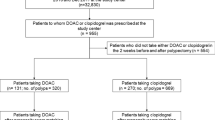Abstract
Purpose
An increasing number of patients are treated with anticoagulation for many medical conditions. Our practice is to suspend warfarin 5–7 days, aspirin 3 days, and clopidogrel (Plavix) 7 days prior to colonoscopy that may require polypectomy. Generally, we accept an INR of ≤1.5 as safe. However, there are no published case series documenting when it is safe to resume these medications after polypectomy. Therefore, the management of anticoagulation after polypectomy varies. We sought to evaluate the safety of our practice with regard to anticoagulation and polypectomy.
Methods
We conducted a retrospective review of all patients over the age of 18 who underwent colonoscopy with polypectomy while on anticoagulation for various medical comorbidities at our institution over a 15-month period (July 2007 to September 2008). All morbidity and mortality that occurred for the first 3 weeks post-polypectomy was recorded. The Mann–Whitney test was performed using SPSS 15.5.
Results
From July 2007 to September 2008, we performed 579 colonoscopies with polypectomy on patients who were on anticoagulation therapy during the study period. Seven (1.2%) patients presented to the Emergency Room or were hospitalized within 3 weeks after polypectomy for lower gastrointestinal bleeding. Distribution of anticoagulants was listed: 2 (28.6%) patients on warfarin, 4 (57.1%) on aspirin, and 1 (14.3%) on clopidogrel. Warfarin was held for, on average, 4 days pre-polypectomy and 1 day post-polypectomy. Aspirin was held, on average, 3 days both pre- and post-polypectomy. Clopidogrel was held, on average 6.5 days pre-polypectomy but restarted immediately post-polypectomy. No statistically significant difference was found between the number of days that anticoagulation was held pre- or post-polypectomy in individuals who did and did not bleed.
Conclusion
We found that our practice of resuming anticoagulation or antiplatelet agents (warfarin, aspirin, and clopidogrel) post-polypectomy was safe and did not prove to significantly affect the post-polypectomy rate of hemorrhage.
Similar content being viewed by others
References
Rex DK, Johnson DA, Anderson JC et al (2009) American College of Gastroenterology guidelines for colorectal cancer screening 2009. Am J Gastroenterol 104:739–750
Seeff LC, Richards TB, Shapiro JA et al (2004) How many endoscopies are performed for colorectal cancer screening? Results from CDC’s survey of endoscopic capacity. Gastroenterology 127:1670–1677
Lee SY, Tang SJ, Rockey DC et al, Korean Association for the Study of Intestinal Disease (2008) Managing anticoagulation and antiplatelet medications in GI endoscopy: a survey comparing the East and the West. Gastrointest Endosc 67:1076–1081
Rosen L, Bub DS, Reed JF III, Natasee SA (1993) Hemorrhage following colonoscopic polypectomy. Dis Colon Rectum 36:1126–1131
Hui AJ, Wong RM, Ching J, Hung LC, Chung SC, Sung JJ (2004) Risk of colonoscopic polypectomy bleeding with anticoagulants and antiplatelet agents: analysis of 1657 cases. Gastrointest Endosc 59:44–48
Gibbs DH, Opelka FG, Beck DE, Hicks TC, Timmcke AE, Gathright JB Jr (1996) Postpolypectomy colonic hemorrhage. Dis Colon Rectum 39:806–810
Eisen GM, Baron TH, Dominitz JA et al, American Society for Gastrointestinal Endoscopy (2002) Guideline on the management of anticoagulation and antiplatelet therapy for endoscopic procedures. Gastrointest Endosc 55:775–779
Yousfi M, Gostout CJ, Baron TH et al (2004) Postpolypectomy lower gastrointestinal bleeding: potential role of aspirin. Am J Gastroenterol 99:1785–1789
Witt DM, Delate T, McCool KH et al, WARPED Consortium (2009) Incidence and predictors of bleeding or thrombosis after polypectomy in patients receiving and not receiving anticoagulation therapy. J Thromb Haemost 7:1982–1989
Friedland S, Sedehi D, Soetikno R (2009) Colonoscopic polypectomy in anticoagulated patients. World J Gastroenterol 15:1973–1976
Shiffman ML, Farrel MT, Yee YS (1994) Risk of bleeding after endoscopic biopsy or polypectomy in patients taking aspirin or other NSAIDS. Gastrointest Endosc 40:458–462
Hittelet A, Deviere J (2003) Management of anticoagulants before and after endoscopy. Can J Gastroenterol 17:329–332
Kim HS, Kim TI, Kim WH et al (2006) Risk factors for immediate postpolypectomy bleeding of the colon: a multicenter study. Am J Gastroenterol 101:1333–1341
Disclosure
The Authors have no relevant financial relationships.
Author information
Authors and Affiliations
Corresponding author
Rights and permissions
About this article
Cite this article
Khubchandani, I.T., Heyrosa, M.G. & Thekkeurumbil, S.V. Optimal timing of anticoagulation pre- and post-colonoscopy with polypectomy. Tech Coloproctol 15, 185–189 (2011). https://doi.org/10.1007/s10151-010-0668-y
Received:
Accepted:
Published:
Issue Date:
DOI: https://doi.org/10.1007/s10151-010-0668-y




